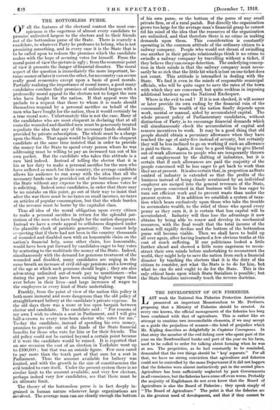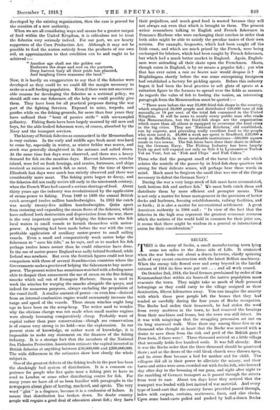THE DEVELOPMENT OF OUR FISHERIES. T AST week the National Sea
Fisheries Protection Association 4 presented an important Memorandum to Mr. Prothero, proposing that a Ministry of Fisheries should be created. As every one knows, the official management of the fisheries has long been combined with that of agriculture. This is rather like an attempt to combine two irreconcilable elements, if we may accept as a guide the prejudices of seamen—the kind of prejudice which Mr. Kipling describes so delightfully in Captains Courageous. In that story the member of the cod-fishing crew who spent part of the year on the Newfoundland banks and part of the year on his farm, used to be called to order for talking about farming when he was at sea. The proprieties, as he had constantly to be reminded, demanded that the two things should be " kep' separate." For all that, we have no strong conviction that agriculture and fisheries could not be controlled by the same Department if it did not happen that the fisheries were almost instinctively put in the second place. Agriculture has been sufficiently neglected by past Governments in all conscience, but the fisheries have come off even worse. Probably the majority of Englishmen do not even know that the Board of Agriculture is also the Board of Fisheries ; they speak simply of " The Board of Agriculture." The point is that the fisheries are in the greatest need of development, and that if they cannot be
developed by the existing organization, then the case is proved for the creation of a new authority.
When we are all considering ways and means for a greater output of food within the United Kingdom, it is ridiculous not to treat the fisheries very seriously indeed. For our part, we are hearty supporters of the Corn Production Act. Although it may not be possible to feed the nation entirely from the products of our own soil, an approximation to that condition can be and ought to be achieved :-
"Another age shall see the golden ear Embrown the slope and nod on the parterre, Deep harvest bury all their pride has planned, And laughing Ceres reassume the land."
Now, it is hardly an exaggeration to say that if the fisheries were developed as they could be we could fill the margin necessary to make us a self-feeding population. Even if there were not unanswer- able reasons for developing the fisheries as a national policy, we should still owe our fishermen all the help we could possibly give them. They have been for all practical purposes during the war part of the fighting Services. Exposed to mine, torpedo, and gunfire while on the fishing-grounds, for more than four years they have suffered their " bout of passive strife " with unexampled gallantry. Fishing fleets have been largely manned by old men and boys, for the able-bodied fishermen were, of course, absorbed by the Navy and the transport services.
The history of British fisheries as summarized in the Memorandum is very curious. In the early and middle ages fresh meat was hard to come by, especially in winter, as winter fodder was scarce, and stock was generally slaughtered in the autumn and salted down.
At the same time fast days were observed, and there was a heavy demand for fish on the meatless days. Harvest labourers, even far inland, were fed on fresh herrings, and armies, fortresses, and ships received as rations as much fish as meat. By the time of Queen
Elizabeth fast days were much less strictly observed and there was considerably more meat. The fishing ports began to decay, and
the fisheries did not really revive till early in the nineteenth century, when the French Wars had caused a serious shortage of food. About thirty years ago the industry was revolutionized by the application of steam-power to fishing. From 1889 to 1899 the annual British catch averaged twelve million hundredweights. In 1913 the catch was nearly twenty-five million hundredweights. Quite apart from restoring and expanding the steam fleets of the fisheries, which have suffered both destruction and depreciation from the war, there is the very important question of helping the fishermen who fish local waters in small vessels to furnish themselves with motor- power. A beginning had been made before the war with the very profitable application of auxiliary motor-power to small sailing vessels. Even a small and comparatively weak motor helps the fisherman to " save his tide," as he says, and so to market his fish perhaps twelve hours sooner than he could otherwise have done.
In the use of motor-power England was sadly behind Scotland, while Ireland was nowhere. But even the Scottish figures could not bear comparison with those of several Scandinavian countries where the Governments make a practiceof helping the fishermen to buy motor- power. The present writer has sometimes watched with a feeling more akin to despair than amusement the use of steam on the fine fishing smacks which sail out of Ramsgate Harbour. Steam is used to work the winches for warping the smacks alongside the quays, and
indeed for numerous purposes, always excluding the propulsion of the vessel itself. A similar amount of power—or even less—derived from an internal-combustion engine would enormously increase the range and speed of the vessels. These steam winches ought long ago to have been on the scrap-heap. The writer used to wonder why the obvious change was not made when small marine engines were already becoming comparatively cheap. Probably want of capital rather than pure conservatism—though sea conservatism
is of course very strong in its hold—was the explanation. In our present state of knowledge, or rather want of knowledge, it is
impossible to make any statement on the finances of the fishing industry. It is a strange fact that the members of the National Sea Fisheries Protection Association estimate the capital invested in British fisheries at anything between £50,000,000 and £200,000,000. The wide differences in the estimates show how cloudy the whole
subject is.
One of the greatest defects of the fishing trade in the past has been
the shockingly bad system of distribution. It is a common ex- perience for people who live quite near a fishing port to have to send to London or some other distributing centre for fish. For many years we have all of us been familiar with paragraphs in the newspapers- about gluts of herring, mackerel, and sprats, The very word " glut " is a disgrace, because it is a confession of failure. It means that distribution has broken down. No doubt country people will require a good deal of education about fish ; they have their prejudices, and much good food is wasted because they will not always eat even that which is brought to them. The present writer remembers talking to English and French fishermen itt Penzance Harbour who were exchanging their catches in order that both sides might be able to satisfy the peculiar tastes of their own nations. For example, langoustes, which had been caught off the Irish coast, and which are much prized by the French, were being exchanged for lobsters, which had been caught by French fishermen, but which had a much better market in England. Again, English- men were unloading all their skate upon the Frenchmen. Skate, though eaten in England, is by no means a popular fish ; yet who that has ever eaten a raie au beurre noir would despise it ? At Brightlingsea shortly before the war some enterprising foreigners had established a factory for pickling sprats. Before this industry began it had been the local practice to sell gluts of sprats at a
ruination figure to the farmers to spread over the fields as manure. As regards the value of fish in feeding the nation, an interesting paragraph from the Memorandum must be quoted :-
" There were before the war 25,000 fried-fish shops in the country, which employed 50,000 people and distributed 150,000 tons of fish annually, or 18 per cent. of the total fish consumed in the United Kingdom. It will be news to nearly every public man who reads this Memorandum, but the fried-fish shops are the organisation which more than all others is equipped to overcome the food crisis in the big cities. They are 'National Kitchens,' old established, run by experts, and providing really excellent food to the people who most need it. £8,000 a week are spent in Bradford, £20,000 a week in Sheffield, in these invaluable institutions-560,000 square meals in two towns. The fish friers have done their share in defeat- ing the German Navy. The Fishing Industry has been largely built up and will expand not only on Sole A la Lyonnaise or Turbot Vol au Vent, but on ' Fish and Chips ' and Fish Cakes."
Those who find the pungent smell of the burnt fats or oils which salutes the nostrils of the passer-by in fried-fish-shop quarters too strong for their delicate senses, will perhaps bear these words is mind. Much must be forgiven the smell that was one of the things necessary to defeat the German Navy !
During the war a very large stock of fish must have accumulated,
both bottom fish and surface fish.% We must both catch them and distribute them by more efficient and prompter means. This is not only a matter for home management in the provision of better docks and harbours, freezing establishments, railway facilities, and so forth ; it is also a matter for international settlement. A great American authority in 1908 said : " In view of the fact that the fisheries in the high seas represent the greatest economic resource which the nations of the world hold in common for their joint use, it seems that there might be wisdom in a general or international union for their consideration."











































 Previous page
Previous page